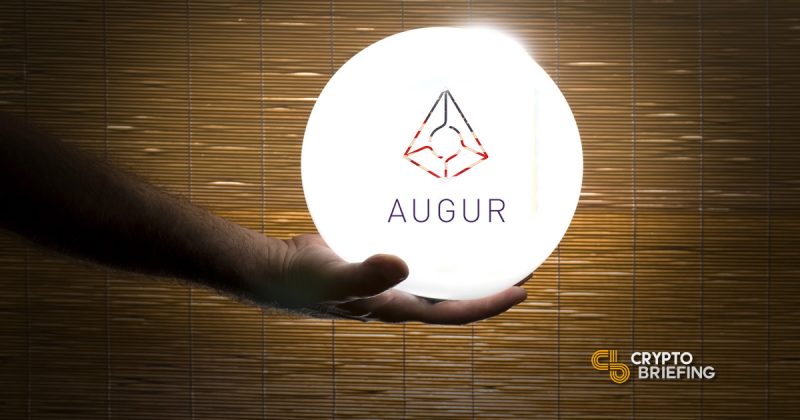
Revealed: Two Whales Made Up 75 Percent Of Augur Midterms Bet
The Augur midterm elections market suggested the REP predictions market was winning at last: but in reality, two whales were playing chicken.
The midterms were more carefully-watched than usual this year because it was the first time the American electorate went to the polls to express their opinion on the Trump presidency.
And it proved to be an interesting test for the decentralized predictions market, Augur (REP).
Augur’s surge in popularity in the immediate run-up to the midterms was due to bets on the electoral outcome. Two weeks ago, when Crypto Briefing originally looked into the increasing popularity of the platform, it was the third largest bet on the predictions platform. This week it became the largest, with roughly $1.3m worth of Ether (ETH) at stake; for perspective, the second biggest bet currently has just over half a million.
That’s interesting because the platform had suffered from a marked decline in daily active users since it launched back in the summer. As Crypto Briefing has already highlighted, at one point in September there were just 38 active users. Although this doesn’t necessarily effect open bets, it suggested Augur was struggling to expand outside of its base.
But what if it transpired that the big midterm Augur bet was principally made up of two whales?
Whales controlled the Augur midterms
A source familiar with the matter told Crypto Briefing that two whales comprised roughly three-quarters of the Augur midterms market. Over the past week, both sides slowly upped one another on the stakes.
According to the source, who has asked to remain anonymous, this started out with one whale placing a 1000 Ether (ETH) bet on the Republicans to win the House. This happened Friday, November 2nd when the amount at stake was somewhere between $75,000 to $150,000. Later that same day, at approximately 16:00 EST, the other participant upped the bet with a 1,500 ETH bet on the Democratic party to win in the midterms.
“In the midterm market, one whale posted a substantially large order on the Republicans that was priced above the market rate”, the source said. “The other trader was able to quickly identify the trade to take the other side.”
Thus began a period of intense betting between the two parties. So much so that it made this one bet the largest one on the Augur platform. By the weekend, the amount at stake had ballooned to approximately $500,000 worth of ETH; by the start of Monday, it was closer to $800,000.
As the bet began to rise in profile – and news outlets began reporting on it – the market share of the two whales began to drop. But not by that much. According to Etherscan, by the close of the bet, one of the whales made up around 41% of the Democrat-to-win stake; the other whale made up around 37% of the Republican stake.
Taking out the tie-stake, the two whales controlled approximately 75% of the Augur midterms market.
Nonetheless, the two whales controlled a combined value of approximately $975,000 of the Augur midterms market.
What does this say about Augur?
The US midterms bet caught the public’s imagination; it was the first Augur market to settle at over $1m. It also performed better than some of its centralized rivals. PredictIt, which also ran a midterm election betting market, crashed multiple times. In comparison, Augur worked without a hitch.
The fact that two whales constituted such a large percentage of the US midterm market, however, comes as no surprise. Augur has long had a problem with attracting new users. Although participants can now use a community built interface – an official Augur website is in development – the high barrier to entry continues to dog decentralized betting, and will likely do so for some time to come.
Augur won’t be sustainable long-term relying on two big betters.
If they don’t capitalize on the publicity they received during the midterms, who can predict when (or if) the next big chance will come their way?
(Interestingly, by the way, the guy who voted REP lost.)
This author is invested in ETH, which is mentioned in this article.
